|
|
|
Sort Order |
|
|
|
Items / Page
|
|
|
|
|
|
|
| Srl | Item |
| 1 |
ID:
126736
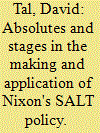

|
|
|
|
|
| Publication |
2013.
|
| Summary/Abstract |
President Richard Nixon and his National Security Adviser, Henry Kissinger took great pride in their success to achieve agreements on the limitation of Anti Ballistic Missiles and the Interim Agreement on Strategic Missiles with the Soviet Union. For Nixon, this agreement was not only an achievement that had been denied to his predecessor, it also seemingly represented the success of his own approach over that of his predecessors. Nixon-in tandem with Kissinger-intended to link arms control negotiations with the Soviet Union to the resolution of other political problems such as Vietnam, the Mideast, and Berlin. Through the employment of linkage, they hoped to make U.S. arms control policy part of Détente. However, Nixon was able to sign the "historic agreements" because his policy of linkage had in fact failed. It failed mainly because it was based on flawed assumptions and false premises. Thus, the historic success was possible precisely because Nixon had not actually made his arms control policy "distinct" from that of the Johnson Administration and its predecessors in his approach to strategic arms talks with the Soviet Union
|
|
|
|
|
|
|
|
|
|
|
|
|
|
|
|
| 2 |
ID:
126733
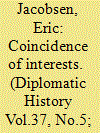

|
|
|
|
|
| Publication |
2013.
|
| Summary/Abstract |
This article will demonstrate that in 1963 the administration of President Kennedy helped create a Ba'th regime in Iraq and then provided it with assistance in order to secure U.S. interests, including access to oil and the containment of both Communism and Arab nationalism. On February 8, 1963, the Ba'th overthrew the dictatorship of General 'Abd-ul-Karim Qasim, an Iraqi nationalist who was seen by both the Eisenhower and Kennedy administrations as a threat to U.S. interests. U.S. policy makers provided the Ba'th regime with military and economic assistance, including sales of military equipment, credits for agricultural surpluses for credit under Public Law 480, and Export-Import Bank loans. Policy makers also encouraged private U.S. businesses to sign contracts with Iraq, supplied the Ba'th regime with ammunition to use against Kurdish rebels, used the Central Intelligence Agency to provide it military equipment, and ignored the Export-Import Bank's policy that prohibited financing arms sales.
|
|
|
|
|
|
|
|
|
|
|
|
|
|
|
|
| 3 |
ID:
126717
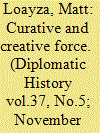

|
|
|
|
|
| Publication |
2013.
|
| Summary/Abstract |
This work examines the role of the State Department's Leader and Specialist programs in realizing the Eisenhower administration's (1953-1961) inter-American policies. Touted publically as a means of enhancing international goodwill, these two state-sponsored exchanges sought to cultivate more favorable views of the United States among foreign publics. The Leader programs invited foreigners to the United States for short-term visits, whereas the Specialist program financed extended travel for both foreign professionals going to the United States, and to Americans traveling overseas. In Argentina, Brazil, and Chile, U.S. officials emphasized the importance of persuading Latin Americans to reject economic nationalism in favor of free enterprise. Although U.S. officials attempted to direct the experiences of participants to maximize the likelihood of positive results, the programs failed to curb economic nationalism in the Americas. Nevertheless, these programs reflect the extent to which ideology and nationalism informed the policy making of U.S. officials during the early Cold War.
|
|
|
|
|
|
|
|
|
|
|
|
|
|
|
|
| 4 |
ID:
126739
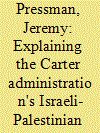

|
|
|
|
|
| Publication |
2013.
|
| Summary/Abstract |
This article challenges critics of the Camp David accords who acknowledge only limited accomplishments or contend the United States was covering for Israeli settlement expansion while seeking to thwart Palestinian self-determination. President Jimmy Carter and his administration sought to create a new pathway toward peace given the unwillingness of Israel's right-wing government under Menachem Begin to support Israeli withdrawal from the West Bank and Palestinian statehood. Carter officials saw the U.S. ideas as a middle way that might get the ball rolling and open a door to peace, however partial and however tentative the process might be at the beginning. Their best-case scenario was that the new U.S. approach would start to transform what the parties thought was possible with regard to the Palestinian question
|
|
|
|
|
|
|
|
|
|
|
|
|
|
|
|
| 5 |
ID:
126735
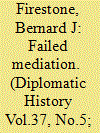

|
|
|
|
|
| Publication |
2013.
|
| Summary/Abstract |
U.N. Secretary General U. Thant (1961-1971), a vocal and persistent critic of the American war effort in Vietnam, attempted, with little success, to initiate negotiations to end the war. His efforts included public calls for negotiating formats that would include all the parties to the conflict, such as a reconvening of the Geneva Conference, and behind-the-scenes diplomacy to produce direct negotiations between the United States and North Vietnam. This article argues that Thant's failure to serve as a mediator had less to do with his own skills as a diplomat than they had to do with the Johnson administration's determination to achieve a military solution to the war. In this regard, the results of Thant's efforts were little different from those of other would-be mediators who also tried and failed to initiate negotiations.
|
|
|
|
|
|
|
|
|
|
|
|
|
|
|
|
| 6 |
ID:
126710
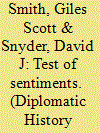

|
|
|
|
|
| Publication |
2013.
|
| Summary/Abstract |
For the best part of three decades, from 1946 until 1977, civil aviation played a central role in Dutch-American diplomatic relations, consistently causing major friction at the highest levels of both the government and the business sector on both sides of the Atlantic. Yet up till now this remarkable episode in the relations between two close transatlantic allies has remained under-researched and neglected by traditional diplomatic historians unable to grasp its full significance. The dispute centered on the ostensibly anodyne wish of the Dutch national airline, KLM, to expand its access to airports in the United States. Yet the "landing rights question" exposed more than ever the uneven power relations, clashing national interests, and antagonistic perceptions that lay behind the otherwise friendly relations between Washington and The Hague. The article examines the causes and consequences of these tensions through four intense periods of negotiations in the 1940s, 1950s, 1960s, and 1970s, each case involving a set of actors, interests, and strategies. On the U.S. side, the divergence between diplomatic and commercial interests lay at the heart of a hard-nosed civil aviation policy that was not prepared to give the Dutch what they wanted. Meanwhile for the Dutch, KLM represented the epitome of national pride and pioneering enterprise, and U.S. intransigence on the landing rights issue was regarded as hypocritical and a direct threat to the continuing vitality of the airline itself. Looking to overcome this asymmetric deficit, the Dutch employed various strategies-public diplomacy, the contacts of elite networks, the "rights" of a close ally-to secure results. Coming from the perspective of "New Diplomatic History," the article maintains that traditional state-centered historiography tends to miss the deeper terrain on which bilateral and multilateral relations among the western allies were conducted. As a result, it provides a behind-the-scenes view of alliance politics from a unique angle during the Cold War.
|
|
|
|
|
|
|
|
|
|
|
|
|
|
|
|
| 7 |
ID:
126719
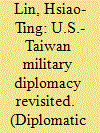

|
|
|
|
|
| Publication |
2013.
|
| Summary/Abstract |
This article seeks to retrace the making of the 1954 U.S.-Taiwan military alliance and shed new light on the Taiwanese perception of the issue. As will be revealed, the conclusion of the 1954 defense treaty between Washington and Taipei was not only a result of the American Cold War strategy in the Far East, as the numerous existing historical literature have admirably depicted. It was also a representation of Chiang Kai-shek's sophisticated military diplomacy, involving the role of a hitherto little-known group of Japanese then serving as his "unofficial" advisors. New historical evidence also suggests that, in this military diplomacy, Chiang played with the United States, for signing a defense pact was originally not one of his priorities. Rather, what Chiang had initially sought from America was the means by which to rearm his forces so as to strengthen his position to launch a military recovery of the mainland.
|
|
|
|
|
|
|
|
|
|
|
|
|
|
|
|
| 8 |
ID:
126727
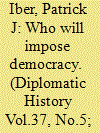

|
|
|
|
|
| Publication |
2013.
|
| Summary/Abstract |
This article examines the life of Sacha Volman (1923-2001), a Romanian exile who became a key conduit for CIA support to Latin America's anticommunist left during the Cold War. It traces the evolution of the front groups that underwrote his activities, his involvement with institutes for political training and the production of propaganda in Mexico and Costa Rica, and, most importantly, his organizing in support of the short-lived presidency of Juan Bosch (1963) in the Dominican Republic. The article argues that, contrary to traditional accounts, the Cold War environment and the actions of the United States provided certain opportunities for the political left in the region-provided, of course, that it was an anticommunist left. Yet CIA support was a weak form of commitment on the part of the United States. In the end, Volman's ally Bosch was overthrown and President Johnson sent troops to prevent him from being restored to power, while much of the propaganda produced by his movement was easily appropriated by the very powers that had deposed it. Acceptance of the hegemonic position of the United States and its anticommunist agenda-the same thing that gave social democratic parties their lease on life in the international arena-left them with little political flexibility.
|
|
|
|
|
|
|
|
|
|
|
|
|
|
|
|
|
|
|
|
|